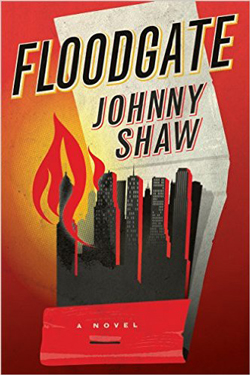 I am a fan of crime fiction, and while I tend to prefer hard-boiled and noir books, I do my best to read from different eras, different countries, and within different subgenres. I’ve even been known to pick up a cozy mystery every once in a while. It’s important to me to see what has been done and what others are doing.
I am a fan of crime fiction, and while I tend to prefer hard-boiled and noir books, I do my best to read from different eras, different countries, and within different subgenres. I’ve even been known to pick up a cozy mystery every once in a while. It’s important to me to see what has been done and what others are doing.
The dilemma that I am faced with as a reader when I pick up a crime novel is whether I want to read a book that sticks closer to the conventions and gives me a fun, yet maybe more familiar book—or do I want a book that maintains its genre elements, but subverts them and challenges the reader with some new ideas, either in content or style. As a reader, it depends on my mood. As a writer, I strive to do both simultaneously.
It’s one of the reasons that I find it so important to read outside of the genre and even look to other media for inspiration and influence.
When I was exclusively writing screenplays, it was not uncommon for me to write wildly different kinds of screenplays during the course of one year, ranging from horror to comedy to thriller. The anonymity of the screenwriter allows for a little more diversity in subject matter. That’s because nobody goes to the movies for the writer. With books, there are good arguments to stay within one genre.
Personally, as a writer that has no intention of writing the same book twice, that created an interesting dilemma for me. And what led me to write my new novel, Floodgate.
My first three books were all set in the desert southwest—different books, but within a similar setting. I had actually started a fourth novel, a stand-alone titled No Accounts, but I stalled on it. Nothing I couldn’t have written my way out of, but I realized that I needed to get out of the desert (very similar to my 17 year-old self that needed to get out of the desert way back when). It was time for me to write something different. Still a crime novel, but different in every way.
I pitched Floodgate to my publishers as, “what would happen if John Dos Passos was hired to write the movie novelization for Big Trouble in Little China.” And yes, I got that same blank stare in response.
Essentially, I wanted to pull a bunch of ideas from outside the genre, and even outside the medium, and jam them all together in one book. Some of the ambitions realized, some abandoned, what I ended up with is a book that is definitely recognizable as genre, but influenced from outside.
For example, for the story to work, I needed to set the book in a city with a very specific history—a history that didn’t exist. I needed to do some world-building, a part of writing more commonly seen in fantasy and science fiction (although all stories require some level of world-building, even if they’re set in real places). I needed to build a place that wasn’t just a name, but also a character that had rich history, atmospheric neighborhoods, and its own personality.
There were going to be police procedural elements, but I wanted to veer away from McBain and the Scandinavians. I was more interested in how comic books handled super-hero teams like the Justice League and the Avengers. The team dynamic was similar but distinct in the formation and introduction of the teams.
I know I mentioned Dos Passos earlier—while a lot of it didn’t make it into the book, there were experimental elements of John Dos Passos’s novels that I found compelling in creating an internal world. In the USA trilogy, he uses segments called “The Camera Eye” and “Newsreels” to create atmosphere and context. I chose flashbacks and epigraphs before each chapter to attempt to do the same.
There’s even a section of the book written in screenplay format.
And then, for the tone, I wanted to capture an era in film that I will refer to as “1980’s Bananas.” There really isn’t a literary equivalent of the 1980’s action movie, a certain kind of over-the-top fun that was only really made in that era—the pinnacle to me being the John Carpenter film, “Big Trouble in Little China.”
If you know my work, you’ll know that there’s nothing I like more than an ordinary, even hackneyed premise. The more ordinary, the more I’m going to have to step it up in the execution. I wrote a novel about three guys searching for gold, for crying out loud.
So I took all these ideas and threw them in a cauldron and what came out was Floodgate. Trust me, It ain’t like anything you’ve ever read before.
Copyright © 2016 Johnny Shaw.
To learn more or order a copy, visit:
opens in a new window![]() opens in a new window
opens in a new window![]() opens in a new window
opens in a new window![]() opens in a new window
opens in a new window![]()
Johnny Shaw is the author of the Spotted Owl Award–winning Jimmy Veeder Fiasco series of novels—including Plaster City and Dove Season—as well as the Anthony Award–winning adventure novel Big Maria. His short fiction has appeared in Thuglit, Crime Factory, Shotgun Honey, Plots with Guns, and various anthologies. He was the creator and editor of the hard-boiled fiction magazine Blood and Tacos. He lives in Portland, Oregon.
